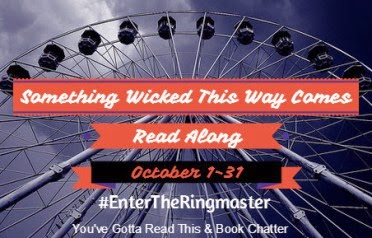Ever since I started dabbling in graphic novels (and maybe even before) I've been hearing about the Maus books. I knew they were about WWII, and they were critically acclaimed. In fact, it is the only graphic novel to receive the Pulitzer Prize.
My husband usually pays very little attention to what I am reading, but when he saw these books sitting on the counter, he did a double-take. Even HE had heard of them.
Synopsis: Art Spiegelman, who has been known for his underground comics in the '60's and '70's, has always struggled with his home life. His mother Anna committed suicide when he was a young man, and he has always had trouble connecting with his father Vladek. To remedy this, he decides to interview his father about he and his mother's experience during the Holocaust. Art then deftly translates this experience into illustrated drawings. Throughout the book, in an earnest attempt to show race and class stratification, Spiegelman depicts Jews as mice, non-Jewish Germans as cats, Poles as pigs, French as frogs, and Americans as dogs.
His father begins his story telling about how he met Art's mother, and how, before the war, was a resourceful man of many talents. Vladek was always able to make a living, learning any trade quickly. After the Nazi's began their movement against the Jews, however, everything was taken from Vladek, his friends and family, and were forced to move from city to city, hide in cellars or attics, and scrap for food to survive.
At the same time, Art delves into his relationship with his father, his father's idiosyncrasies. Vladek is stubborn, emotionally needy, and insanely frugal, which drives his new wife Mala crazy. Vladek is also a shrewd survivor. Ironically, although Vladek has experienced the worst type of racism possible, is a racist himself, expressing hatred towards African Americans and homosexuals.
The book ends when Vladek and Anna are finally caught and transported to Auschwitz.
My thoughts: Reading about the Holocaust will never be easy. I know this. So why do I constantly surround myself with these books? I like the stories of survival, and I like to hear about this survival from all perspectives. I also feel a kinship with these stories because of my husband's family history.
It does seem counter-intuititve, though, to think that a graphic novel filled with animals would be a hard thing to read, but it was. I actually mentioned this when I was reviewing a graphic novel recently about the Green River Killer. Put it in pictures and the images are forever burned into your mind.
I thought that using animals to symbolize different races and ethnicities was brilliant. At this point, we have all seen pictures of Holocaust victims, and in order to protect our own mental stability, I think we have trained our eyes to blur out the images. Seeing them in the form of mice is jarring. It is something we are not used to seeing, and it forces you to view it as if it were the first time.
When the Jews are attempting to blend into the crowd and avoid German detection, Spiegelman illustrates the mice wearing pig masks in order to look like Poles. I was blown away by this image. Totally blown away. I can't explain WHY this affected me like it did. My words aren't forthcoming.
The story is as intense as it comes. This is street-level survival here, and nothing is held back. I've read it all before, over and over again, but seeing it in pictures, seeing the hangings, the beatings, the bodies...it is physically sickening to see.
I experienced a strange reaction to Art's father Vladek. The man was scrappy and resourceful, and a survivor to his core. I shook my head in admiration for his ability to keep running, keep thinking of ways to outsmart the Germans. At the same time, in old age, he was thoughtless and rude and obnoxious. He was a bigot. He was cruel to his new wife. I couldn't imagine the amount of therapy the author needed to come to terms with their relationship.
The book ends suddenly with Vladek and Anna entering Auschwitz - a cliff-hanger if you will. I'm not sure why Spiegelman chose to handle the story in this way, but obviously one must immediately turn to Maus II to see it through. It isn't hard to imagine what is coming next, but if I learned anything in the process of reading this book, it was that things were going to get rough. I'll be back on Thursday to talk about it.
5 out of 5 stars
Tuesday, February 21, 2012
Subscribe to:
Post Comments (Atom)










20 comments:
I've been wanting to read the Maus books for a while. I had no idea they're the only graphic novels to win a Pulitzer.
I'm not a graphic novel fan...but I'm curious about this one...I don't "enjoy" reading about the Holocaust but the Jews who were almost extinguished didn't enjoy their experiences either...like you I keep going back for more. I think the scars we create for ourselves are the point of remembering history...hopefully we won't repeat the ugly past if we remember it. I bet I have students in my classes right now who have no clue...they might not even know what the word Holocaust means...I think I'll try a little experiment today ;)
I've read a lot about this but have never felt interested in reading it until your review! I definitely will be keeping this one in mind now. (I was afraid before that I wouldn't get the metaphor with the animals or something, LOL)
I haven't read many graphic novels, but this one is on my wish list. I also love reading about WWI or II. The stories are never easy but I feel like I come away from the stories learning a lot.
I read these a long time ago, but I really prefer prose to graphic novels.
I've had this on my shelf for a long time and for some reason I thought it was you who recommended it to me - I must have psychically known you'd love it! I will get to it one day.
This was my first experience ever reading a graphic novel, and wow -- definitely intense! An old boyfriend swore by graphic novels and maintained I would really enjoy reading Maus. Much as it pains me to admit, he was right. I haven't forgotten this one in the many years since I picked it up, though I never continued the series... sounds like I must remedy that.
I read these when they first came out in paperback. I was struck by the father and by the author's willingness to depict him so clearly. There's a lot of family baggage there that many people would stay away from.
But I think that's what really sets Maus apart from the rest. It's a story of the Holocaust, true, but it's a story of its long term affect on one father and one son. That, even more than the pictures of the mice which are also powerful, is what has stayed with me.
I have heard so much about this book, but have not yet read it. It sounds different and very emotionally complex, and I wonder at what my reactions to it would be. I am sure that this one will make it's way into my hands very soon, and I will have to discuss it with once I have finished. Very powerful and moving review today, Sandy.
I am so, so, so glad you loved this one! I actually loved Maus II even more, so I hope you like it. I thought one of the most interesting things about this book is the fact that his father is such a flawed character. Our society turns Holocaust survivors into saints when we tell their stories and this made the whole thing so much more relatable.
difficult to read?..I find even the cover disturbing.
I know I need to read these. Like you, I've been hearing about them for years. But I will admit that your description makes me realize I need to be in the right frame of mind for this. It sounds very intense.
I didn't know the Maus books won a Pulitzer. That's pretty cool!
This just may get me to read my first Graphic Novel.
Maus I & II were the first graphic novels that I read, and they really set the bar high for other graphic novels. I still have them on my shelf and should re-read them sometime, but I do remember the deep impact they had on me. And the mice with the pig masks is one of the things I remember most vividly. I don't think there's any justification for the father's bad behavior, but I think that seeing the horrible things he went through at least helps the author understand a bit of why he's like that, and by extension helps me to think more about why and how cantankerous people end up the way they are.
Well said. These are the first graphic novels I ever read and I'm not sure anything has quite lived up to them.
Yep, this was INTENSE! I still haven't read the second one. While I was expecting all of the heaviness with the Holocaust subject, I was still surprised by the actions of both of his parents.
I really am kicking myself about missing reading these during the WWII challenge and they won a Pulitzer...though that never sways my reading choices...lol
Ditto what I just said about the second one in my comments.
That Pulitzer is well deserved! I too didn't expect the animal illustrations and the graphic non-fiction format to be so moving and intense.
Post a Comment